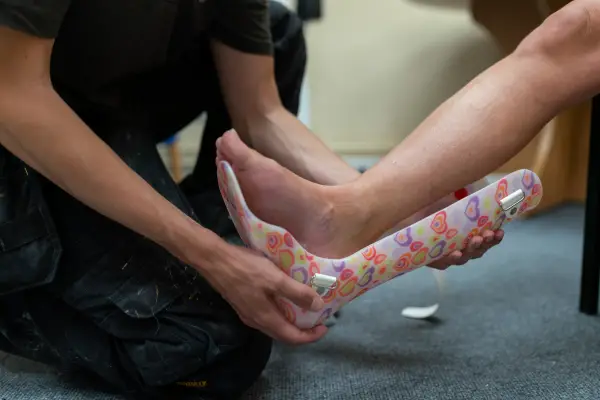
Hiking and trail running often make use of the same trails. They also compete with each other for our time each year.
So what’s better, hiking or trail running?
In this post, I’ll compare the two so that you can decide for yourself.
Table of Contents
Advantages of Hiking Vs Trail Running
There are many benefits of hiking instead of trail running.
Here are the top 5 advantages of hiking vs trail running.
- You’re less likely to become injured.
- It’s easier.
- Your shoes will last longer.
- You’ll have more opportunities for sightseeing.
- You’re less likely to get lost.
Hiking and Trail Running Injuries
Hikers can and do fall victim to injury. They can get blisters, they can fall down, and they can suffer from joint pain.
Fortunately, most hiking injuries aren’t very serious and they are easy to avoid. A careful hiker is unlikely to fall and if you wear the right footwear and take enough breaks, you’re unlikely to get blisters or to suffer from joint pain.
Trail running, on the other hand, can cause serious injuries and they can do so in an instant. The reason for this is that trail running is a high-impact activity.
With each and every stride, your foot will come down hard and it will do so on a variety of surfaces. Instead of just pounding the pavement, you’ll be pounding your feet onto rocks, tree roots, and anything else you might encounter on the trail.

If a small pebble makes its way into your running shoes, you could end up with bruising. You’re also more likely to sprain your ankle as the uneven terrain of a trail is more likely to cause foot twists and rolls.
On top of this, you have the traditional running injuries that all runners face. These injuries might include plantar fasciitis, tendonitis, knee pain, hip pain, and even lower back injuries.
In fact, according to research done at Harvard, a walker only has a 1% to 5% chance of getting injured while a runner has a 20% to 70% chance of getting injured.
You can avoid most of the issues trail runners face just by walking the trails instead of running them.
Hiking is Easier Than Trail Running
Trail running is difficult and it isn’t the best form of exercise or recreation for the weekend warrior or the couch potato. If you’re out of shape, not only will you not have fun, but you’re much more likely to injure yourself.
Hiking is also challenging but it’s something that most people can do. A weekend warrior can go the entire week without hiking and then hit the trails hard on the weekend without much fear of injury.
Also, hiking is less likely to hurt your other workouts. In fact, it may even speed up your recovery time.
This is because low-intensity exercise can help to remove lactic acid build-up without causing much additional stress to your muscles. It’s why professional bodybuilders will often walk for cardio rather than run.
Your Shoes Will Last Longer
This is just basic math. A pair of shoes can only survive so many miles before they wear out. Trail runners move faster through the trails and therefore put more miles on them.
Also, trail runners are generally limited to trail running shoes while hikers can invest in thicker boots and trail shoes. These boots are often more durable than trail runners so you’ll get more miles out of them before you have to replace them.
Hiking and Sightseeing
One of my favorite aspects of hiking is the fact that I get to head out into natural landscapes to enjoy the view. I also get to see wildlife that I might not get to see in my everyday life.
As a hiker, I’m not moving through these landscapes at a rapid pace and it’s easy for me to stop and take pictures. When I’m trail running, I find the opposite to be true. I’m usually so focused on the run that I don’t even really notice the landscape around me.
This was clearly demonstrated to me one day when I was running along a windy mountain bike trail.
The weather was perfect and it was approaching dusk and the trail had already emptied out. I was really pushing myself and my head was down and my arms were pumping furiously.
As I ran around a tight corner, something stomped angrily and snorted at me. It was a big deer.

Luckily, the deer decided to run off rather than attack me but I remember thinking to myself, “what if that had been a bear”?
I’ve never had anything like this happen to me on a hike. When I’m hiking I notice animals far off in the distance and I often stop just to watch them go by.
Trail Runners Get Lost More Often Than Hikers
As the saying goes, “I’d rather be lost in the woods than found in the city”, but this doesn’t mean I want to get lost. I’d imagine you probably don’t want to get lost either.
For this reason, you might want to stick to hiking on unfamiliar trails. As a hiker, you’ll move through the terrain slowly enough to create mental waypoints in your head.
You’ll also move slower so even if you do get lost you won’t have to backtrack as many miles as you would if you had gotten lost on a run.
As the saying goes, “I’d rather be lost in the woods than found in the city”, but this doesn’t mean I want to get lost.
Of course, this shouldn’t deter you from ever going on a trail run. It just means that you need to take some precautions before you do.
Personally, I try not to go trail running on trails that I haven’t already hiked on. I want to be familiar with a trail before I decide to go running on it.
Also, I always take some water with me. Yes, it’s inconvenient to have to carry a water bottle when I’m out on a short run but if it ends up saving my life, it’ll be well worth the inconvenience.
Advantages of Trail Running Vs Hiking
Now that we’ve talked about some of the advantages that hiking has over trail running, let’s talk about some of the benefits of trail running.
Here are 4 reasons to go trail running instead of hiking.
- A better workout.
- Easier to measure progress.
- You get to cover more miles.
- It offers a better cross-training opportunity.
Trail Running Is a Fantastic Workout
A 150-pound person burns around 220 calories per mile while hiking. This same 150-pound person burns over 330 calories per mile when trail running. (data obtained from Health.Harvard.edu)
On top of this, a trail runner is going to run more miles in an hour than a hiker will hike in that same hour. Here is some quick math to demonstrate this fact.
Person A goes for an hour-long hike at 3 miles per hour. This person burns 220 calories per hour and ends up burning 660 calories as 220 multiplied by 3 is 660.
Person B goes trail running for an hour. This person runs at a relatively slow speed of 5 miles per hour. For each mile this person runs, 330 calories are burned. Since 5 multiplied by 330 is 1,650, a total of 1,650 calories are burned during this run.
All things equal, person B will have burned 990 more calories than person A during their time on the trail!
While person B was burning more calories, this person was also working their heart, lungs, and muscles more vigorously than person A.

A trail runner must provide more power to their body than a hiker. This is because when a person walks, their weight is transferred from one leg to the other.
When a person runs, they have to propel their entire body into the air. The person’s weight isn’t transferred back onto their body until they land and when they do land the weight is transferred back with a lot more force.
While this is what leads to more trail running injuries than hiking injuries, it’s also what leads to higher increases in muscle mass and bone density.
Trail Runners Go Further
A trail runner will often cover twice as many miles in an hour compared to a hiker. This is great for people looking to get to faraway vistas without having to stay out overnight in a tent.
It’s also great for people looking for solitude. In my experience, the further you get from the parking lot, the fewer people you see.
The increased speed of trail running also makes trails easier to complete. Not everyone can take a month off from work to go backpacking but if you can cover the same distance in a week or two it might be a lot more feasible.
Trail Running Is a Great Cross-Training Exercise
Trail running will make you a better road runner. This is great for people who want to compete in marathons and half-marathons.
Even if you never intend to do a long road run, trail running can still translate to faster 5k runs.
Hikers don’t experience this benefit. Although hiking will make you fit, it won’t work the same muscles in the same way that running does. It won’t give you a runner’s lungs or a runner’s heart either. To get these benefits, you just have to run.
Why You Might Want to Do Both
Hiking and trail running are both truly unique experiences. They both offer different benefits and to get both of them, you’ll simply have to do both.
Luckily, there is a lot of overlap between them and the same trails that you go hiking on, you can go trail running on. Personally, I like to scout out trails by hiking them first and then trail running on them later.
This gives me the opportunity to enjoy the trail and to look for any potential running hazards before I run through it.



